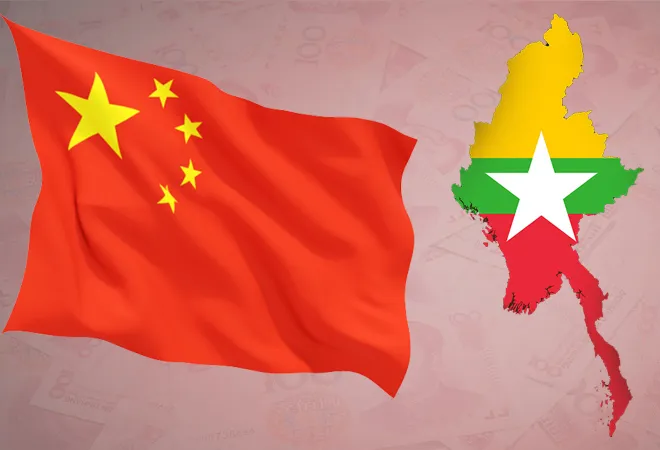
On 27 October, India’s Adani Ports and Special Economic Zone Limited announced that it would withdraw its investment in the military-owned Ahlone Port by June 2022. This announcement comes while the three-day annual ASEAN summit that began on 26 October was ongoing without a representative from Myanmar attending after the regional bloc took a novel decision to bar coup-maker and junta leader, Min Aung Hlaing, from the summit.
If one takes a hard look at the foreign investments, then it has gone down significantly post-coup. Since 2011, approximately 90 percent of FDIs in Myanmar is derived from Asian countries, who have been steadily enhancing economic ties. However, in response to the coup and under pressure from activist groups and western nations, several firms are restricting their ties with the Myanma Economic Holdings Limited (MEHL) and Myanmar Economic Corporation (MEC).
Singapore, which has the highest investment in Myanmar since 2011, is currently removing military affiliated firms from its portfolio. Similarly, Japan has cut its aid post the coup. In addition, some 11 percent of the more than 180 Japanese firms stated that they had terminated their operations in Myanmar due to difficulties in operating business activities. Violence in and around workplaces, internet shutdowns, and scarcity of employees have led office spaces to shut down. Adani has become the latest international investor to leave Myanmar following the coup. Indian companies, both state-owned and private, are on a wait-and-watch mode.
The Junta’s claim that the nation will attract US $5.8 billion in foreign investment before the end of this year seems quite farfetched. However, it is important to keep in mind that the biggest foreign investors are not democratic governments; for instance, China and Thailand. Thus, the coup is not a very valid reason for them or their business conglomerates to cease operations.
Some 11 percent of the more than 180 Japanese firms stated that they had terminated their operations in Myanmar due to difficulties in operating business activities.
Chinese investments in Myanmar
China continues to advance plans for a complex economic corridor under its Belt and Road initiative (BRI) even though deep-seated resentment towards China is increasing across Myanmar. Despite Myanmar’s political turmoil, BRI projects are proceeding with the military junta’s assurance.
The junta has reorganised the working committees of several developmental projects that are crucial under the China-Myanmar Economic Corridor (CMEC). It is speeding up and planning several projects to enhance cooperation between Beijing and Naypyitaw.
China’s projects in Myanmar Post-Coup: (BRI)
| Name of the project |
Total Investment |
Location |
Status |
Development under the regime |
| Mee Lin Gyaing LNG |
US $2.5 billion |
Ayeyarwady region |
On Going |
Approved by Myanmar Investment Commission |
| Kyaukphyu Special Economic Zone (KPSEZ) |
US $1.5 billion |
Kyaukphyu Township, Rakhine State |
On Going |
Reorganised the Kyaukphyu Special Economic Zone management committee with further planning to construct. |
| New Yangon City project |
US $1.5-billion |
Yangon |
Planning |
The land acquisition process is being finalised |
| Chinshwehaw CBECZ |
- |
Northern Shan State |
Planning |
Officials to expedite work on new land border crossing |
| Kanpiketi CBECZ |
US $22.4 million |
Northern Kachin State’s Special Region 1 |
On Going |
Approved by Myanmar Investment Commission |
| Kyaukphyu Power Plant |
US $180 million |
Kyaukphyu Township, Rakhine State |
On Going |
Completed Phase I |
| Kyaukphyu deep sea port |
US $1.3 billion |
Kyaukpyu Township |
On Going |
Joint venture between the Chinese consortium CITIC Myanmar Port Investment Limited and the KPSEZ management committee. |
The repercussions of such investments is two-fold. First, with heavy investments in numerous development projects in Myanmar, China is reassuring and reasserting its strong grip in not only the infrastructural and economic affairs of the country but also at the strategic level at large. It is slowly pushing its hegemony in the region and is able to negotiate deals with the previously suspicious Junta. Secondly, the mere fact that a majority of ongoing projects are signed and implemented post-coup shows how the Junta is determined to display the prosperity of the nation despite sanctions and drops in FDIs. Such a move has ignored the previous issues regarding lack of transparency, trust deficit in the methods and processes used by China, debt scares, and over unsustainable development models.
While Myanmar previously sought to balance Beijing’s involvement by inviting and giving space to other nations such as India and Japan to participate in their development strategies, the current coup and the western as well as regional backlash have brought it closer to China. However, to maintain its autonomy, the military leaders will eventually need to engage with other nations as well.
With heavy investments in numerous development projects in Myanmar, China is reassuring and reasserting its strong grip in not only the infrastructural and economic affairs of the country but also at the strategic level at large.
China also understands that there will be risks for backing many projects in a conflict afflicted region. Due to growing resentment against the Chinese amongst the pro democrats, many Chinese operated companies have been vandalised. Such attacks may increase in the future. While local media reports within Beijing have been condemning the coup in Myanmar; however, the English written or state controlled newspapers have maintained language neutrality, which signals Beijing determined stance to keep its neighbour calm and close. Thus, China seems hopeful that the military leaders will be able to control this situation in time and business will return to normal with the usual ethnic strife.
While other nations remain wary of the growing closeness of China, without a war, free Myanmar investments and development will remain inadequate.
The regional bloc and western nations are currently maintaining pressure on Myanmar to accept the five-point consensus as laid out by ASEAN; a lot depends on the willingness of the military leaders to implement the agendas as proposed by the ASEAN-appointed special envoy. Despite previous failures on different occasions, whether the current tactics will bring about the desired changes is yet to be seen.
China seems hopeful that the military leaders will be able to control this situation in time and business will return to normal with the usual ethnic strife.
The recent sentencing of Aung San Suu Kyi’s close aide for two decades seems to give out a clear message that the Junta will do as it pleases and deems fit. The ex-state counsellor’s closing arguments is also set in two weeks. Sentencing her for a long haul will generate worldwide reparations. Whether the Junta is prepared to play it safe or to do as it pleases will remain essential to determining the future course of actions by regional blocs and western nations.
A peaceful Myanmar remains essential for economic growth and development for not only the country but the region as a whole. Thus, constructive actions still remain essential.
Tarushi Singh Rajaura is a research intern at ORF
The views expressed above belong to the author(s). ORF research and analyses now available on Telegram! Click here to access our curated content — blogs, longforms and interviews.




 PREV
PREV


